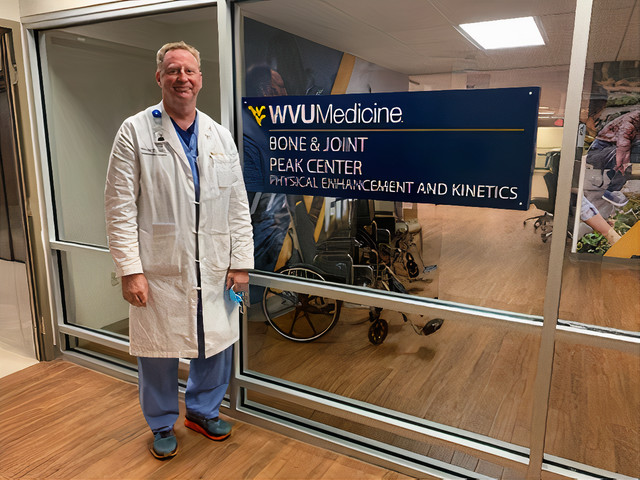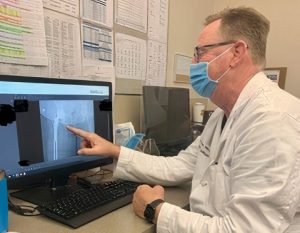PA in Orthopaedic Surgery Shares What It’s Really Like in a Week
Practicing Ortho PA Tom Gocke Talks About His Weekly Work Routine
April 28, 2021
By Tom Gocke, DMSc, PA-C, DFAAPA

My journey to becoming a PA started after I worked 10 years as an athletic trainer. The athletic team I worked with had physicians (orthopaedic surgeons) and three PAs working in their group. I was impressed with the skills and level of knowledge the PAs possessed, as well as how much responsibility they had providing patient care in the orthopaedic clinic. I did a rotation at that orthopaedic clinic during my clinical year in PA school at Wake Forest University and it was a great learning experience. I learned a lot about managing and caring for patients with musculoskeletal injuries, which provided me with the foundation that has helped me grow into the orthopaedic surgery provider that I am today.
[PAs, join Tom at Musculoskeletal Galaxy!]
I am currently working in the Department of Orthopaedic Surgery at West Virginia University (WVU). My responsibility is to co-manage in-patient musculoskeletal injuries/conditions with the respective orthopaedic/medicine services. Most of these patients are admitted as a result of orthopaedic surgeries involving spinal injuries, orthopaedic trauma, total joint replacements, or orthopaedic oncology. Our institution has a geriatric trauma (hip fracture) service that primarily manages our geriatric post-op hip fractures and non-op pelvic fracture patients. The majority of my day is co-managing orthopaedic-related problems for the admitted total joint patients in the WVU Medicine Center for Joint Replacement.
Preparing for the Day
My typical day starts around 6:30 a.m., when I spend time gathering information on the patients on our unit, labs, reading progress/nursing/physical therapy notes, and following up on imaging studies done overnight. I will get hand-off calls or texts from the resident teams regarding their patients, which consist primarily of discharge updates, floor transfers, or any pending surgery add-ons/labs/procedures that need to be followed up on while they are in clinic or surgery. I make rounds with the orthopaedic surgery attendings and residents at various times during the day due to surgery or clinic schedules. I do not typically make rounds with the medicine teams but will touch base with them on any medical issues related to our patients.
[Wherever you want to go in your career, AAPA can help – join or renew your membership today]

A Busy Total Joint Program
At WVU, we do total joint replacement surgery Monday through Friday. This affords me the opportunity to go to the operating room and to assist in cases periodically. It is a welcome change to my daily routine, and I appreciate the chance to get back into the OR. On those days that we have Fast Track (same day discharges) total joint patients, I will coordinate with the nursing staff to ensure patients have met their discharge milestones and review discharge instructions with the patient and their family. Our total joint program is busy, so there are many discharges and discharge summaries throughout the week. I will complete the discharge summaries on the same day the patient leaves – I find it is easier to get it done rather than leaving them to pile up. We also accept patients transferred from other facilities who have complications as a result of periprosthetic fractures, failed total joint replacement, and for complex prosthetic total joint infections. These patients, in addition to requiring surgery, will usually have post-op drains and/or negative-pressure wound vacs that require frequent monitoring. These patients require a significant amount of service coordination between infectious disease, vascular access placement (PICC), pharmacy, and discharge planning. I have gotten to know the providers on these respective teams and appreciate the care that they provide to our patients.
[Take your practice to the next level at Galaxy]
Never Get Complacent
Most of the patients on our unit are stable despite the lengthy medical histories that some of them might have. The medical service teams do a great job of optimizing the patient’s medical conditions, thus minimizing adverse medical outcomes. On occasion, we will have a patient develop unexpected medical problems that require a more immediate response. Recently, we had a patient develop a post-op ileus who developed an adverse reaction to a new medication. This ultimately required the patient to be transferred to the Surgical ICU. A patient with a history of a remote cardiac catherization and stent placement complained of chest tightness post-op. This prompted a cardiac work up which revealed serially elevated Troponin levels. A cardiology consult was ordered, and he was found to have had an NSTEMI. Another patient, who had been admitted for treatment of a prosthetic joint infection, tested positive for COVID-19 on the day they were to be transferred to a rehabilitation facility. These examples help to remind me not to get complacent in my care of patients and to always be aware that anything can happen, especially when you least expect it.
[Earn up to 30 credits of AAPA Category 1 CME with other PAs who practice orthopaedics]
Take What You’ve Learned to the Next Level with Musculoskeletal Galaxy
I attended the first Musculoskeletal Galaxy held in Fort Worth, Texas in 2010 and have attended Galaxy every year since. I also served as the course co-director from 2012 until 2017 and continue to teach Galaxy courses as a faculty member in the Clinical Workshop. Musculoskeletal Galaxy is focused on developing foundational knowledge necessary for new PAs or NPs working in orthopaedics or musculoskeletal-related areas. Galaxy takes what you learned in school to the next level, which is necessary to become an effective orthopaedic provider. I hope to see you at one of the virtual learning sessions at 2021 Galaxy.
Tom Gocke, DMSc, PA-C, DFAAPA, has been a PA in orthopaedic surgery for the past 28 years. Dr. Gocke is a graduate of the Wake Forest University School of Medicine PA program and the University of Lynchburg PA Medicine doctoral program. He is an AAPA Distinguished Fellow. Dr. Gocke can be reached at [email protected].
You May Also Like
Musculoskeletal Galaxy
A Week in the Life of a PA in Orthopaedics
A Day in the Life: How PAs Practice
Thank you for reading AAPA’s News Central
You have 2 articles left this month. Create a free account to read more stories, or become a member for more access to exclusive benefits! Already have an account? Log in.



